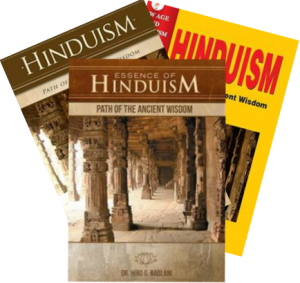From the earliest times, there was a clear call toward vegetarianism in the Hindu society. Yajur Veda calls for kindliness toward all creatures living on the earth, in the air, and in the water. “You must not use your God-given body for killing God’s creatures, whether they are human, animal or whatever” (Yajur Veda 12.32.90).
Manu Samhita advises: “Meat can never be obtained without injury to living creatures, and injury to sentient beings is detrimental to the attainment of heavenly bliss; let him therefore shun the use of meat” (Manu Samhita 5.48-49).
Hindu belief is that all things are rooted in God, and there is God-pervasiveness in every entity.
After the Vedas pronounced that all beings are the family of one God, the Hindu mind became more established toward an attitude of reverence, benevolence, compassion, and auspiciousness toward all creatures. In effect, this certainly aroused people to wean themselves from eating meat. Soon afterwards the concept of non-injury became the model teaching of Hinduism. Manu Samhita stated earliest in the Mahabharata: “Ahimsa Parmo Dharma: Nonviolence is the primary religion,” and later Mahavira and Buddha adopted this as their main teaching. Vegetarian food came to be considered as the sattvic food, which is regarded fit for all spiritual practices. Jainism has always shown greater interest in this direction. Jains not only strictly prohibit their members from eating any animal meat, but they go a step further. They don’t allow root vegetables, such as onions and potatoes, lest some germs be attached to them. Buddhists are believers in non-injury but are more accommodating with regard to prohibited foods. Sikhs, too, have a rather soft attitude in this regard. The majority of Sikhs eat meat, but they do not consume it inside the temple. There is a growing concern over slaughtering of animals around the world, demanding more kindness and gentleness and less cruelty in the process; surely a step toward more vegetarianism in the future. Dairy cows are often commodities for meat, after their milk producing capacity is over, they are sent to slaughter house. Also they are constantly injected with antibiotics and hormones to increase their milk production. This is in stark contrast to Hindu concept of cow, which gives it the dignity of divinity. There are now some slaughter-free dairies in India, U.K. and USA. More are bound to come up. Some pople wrongly advocate that even plants have life. Plants, lacking nervous system, do not endure pain and terror that mortifies animals at slaughter.
Hindus have taken to vegetarianism quite well. Even though only about 20 percent of Hindus are complete vegetarians, the majority of the vast population does not consume meat like other communities, such as Christians or Muslims, do. Meat is not a staple or main diet for Hindus anywhere. I have seen with wonder how even small Hindu children in USA observe vegetarianism without any difficulty whatsoever in school lunches or at parties, where they often have to satisfy their hunger with some salad and then come back home to eat the main meal. Those who do not eat meat for long time, in fact, develop a certain dislike and aversion to it.
Meat is is now regarded as a relatively toxic substance for human consumption. Health authorities worldwide agree that heart attacks, cancers, and many other diseases are more prevalent in the meat-eating population than in the vegetarian population. Above all, the longevity of a person is inversely proportional to the amount of his meat intake; the more meat one eats, the fewer years one may live. Dr Dean Ornish has found that 82 percent of the people who switched to plant based diet were able to reverse their heart disease. It has now been found that the carnivorous animals get plaques (similar to Alzhimer disease) in the brain when they age, herbivores don’t. Vegetarian food provides potassium to the body, which is considered a beneficial element. It also has a more alkaline base that is beneficial to good health in many ways. Vegetarian food is considered a complete diet, especially if there are sufficient dairy products and nutrient foods like soya in the diet. Some may consider milk products as non-vegetarian food, as its source is animals, but this is not acceptable to the Hindu point of view. Dairy forms the essential part of the Hindu diet, and it is therefore labeled as lacto-vegetarian. The average combined vegetarian meal contains a sufficient amount of the protein and other constituents needed by the body. Some people feel that vegetarian food is not easily available in most restaurants in the West, but now, with the increasing demand for the vegetarian meals, the restaurant industry is responding with many positive options. !n September 2018, California Governor signed a bill providing plant-based vegetarian food, as an option in all health care facilities and prisons.
Human anatomical and physiological evidences lean in favor of vegetarianism—a human being’s teeth, digestive tract, and other bodily mechanisms are akin to plant-eating animals, not the carnivorous ones. Beyond that, there is also strong evidence that meat production is becoming a costly affair. There is also an important ecological reason that is now becoming increasingly persuasive—destruction of ancient rainforests is significantly related to creating pasturelands for livestock meant to provide the meat for human consumption. Studies at the University of Chicago showed that a typical American meat eater is responsible for nearly 1.5 tons more carbon dioxide a year than a vegan! It is said that one hundred million people could be adequately nourished, if only the Americans reduced their meat intake by a mere 10 percent.86Forbes magazine in April 2019 quoted Nobel lauret Steven Chu that humans and animals they eat account for 96 % of carbon mass production, while all the Earth’s wild life for just 4 %. There is also a general misconception that ancient people anywhere ate mostly meat! In fact meat was then even rarer commodity as it was relatively more difficult to procure. They ate more of herbs, wild plants, nuts etc. to sustain themselves, and only little of meat when available. Humans went from mostly vegetarian to mostly carnivorous diet only recently.
U.N.report says that raising animals for food generates more greenhouse gases than all the cars and trucks in the world combined. The real problem is in America, where the birth of one child has the same impact on environment as the birth of 70 Indonesian children. All in all, there is undoubtedly a celebration in the vegetarian camp. For many Hindus, vegetarianism is a passion. There has been a gradual increase in the non-meat-eating population all over the world. At present, a rough estimate is that there are over ten million people in the United States who are vegetarians.
In America, there seems to be a strange phenomenon. Fire engines may be called to save a bird when it is caught in electrical wires, or perhaps an entire town will come forward to rally around a dying whale that is beached on the shore. But these same people would have no problem sitting at their dinner tables and eating birds, animals, and fish without hesitation. Many Muslims are now completely or mostly vegetarians. The former president of India, Abdul Kalam, was a vegetarian. The vegetarian movement is undoubtedly marching ahead with great force. Sadhu Vaswani’s birthday on November 25 is celebrated as International Meatless Day, when millions of people around the globe pledge not to eat meat. Dada J.P. Vaswani said, “Just as women do not exist as resources for men, just as black people do no exist as resources for white people, even so plants do not exist as resources for human beings.”One of the giant literary figures of the twentieth century, George Bernard Shaw, wrote: “My stomach and body are not a crematorium or cemetery for killed or dead animals. While we ourselves are the living graves of murdered beasts, how can we expect any ideal conditions on this earth?”
Hindus regard all life as sacred, human life as well as other beings. In their search for alternate sources of food in the very early periods of history, they discovered that some of the animals that were killed for food could be harnessed to co-operate in producing the non-meat meals for them. The cow was identified as the most important animal in this regard. Its nourishing milk established its status of mother or goddess. According to the Hindu mythology, the foremother of all cows, Surabhi, emerged from the primeval ocean of milk to bless the world with plenty.87 She earned the status of goddess, alternating her form with Mother Earth and Shri Sita of the Ramayana. The male bull would be used for plowing the land for agriculture. Soon India became an agricultural country, which it remains to this day. The humble appearance and nature of the cow has given her added grace and dignity. She has been granted the symbol of divinity as Kamadhenu, the wish-fulfilling cow! In recognition of her invaluable services to humanity, Hindus in India have built thousands of cow homes, or gaushalas, all across the country, where weak and infirm cows are lovingly taken care of in their later years. This in itself is a unique phenomenon to be noted only in the Hindu society. The Godham in Rajsthan (India) currently cares for 125, 000 cows. Over the years it has donated 175,000 cows to farmers. Our sanskars (cultural beliefs) are such that we believe dhenu (cow) and dharti (Earth) are holy and co-dependant on each other. If dhenu is not there, then dharti will become barren and poisonous. If the Earth is not there, then cow will have no grazing ground. Dairy cows are often commodities for meat, after their milk producing capacity is over, they are sent to slaughter house. Also they are constantly injected with antibiotics and hormones to increase their milk production. This is in stark contrast to Hindu concept of cow, which gives it the dignity of divinity. There are now some slaughter-free dairies in India, U.K. and USA. More are bound to come up.
Mahatma Gandhi, whose teachings of non-violence resonate even with the most hardened people all over the world, wrote in regard to cow protection, “Cow protection to me is not mere protection of the cow. It means protection of all that lives and is helpless and weak in the world.” Compassion is a teaching of all religions. All sentient beings have feelings. Vegetarianism is a cause for millions of non-speaking members of the global community who are driven mercilessly toward the slaughterhouses, day in and day out, through no fault of their own. It is believed that an average meat-eating human being consumes the flesh of nearly one hundred animals in his lifetime. More and more people now protest against the various types of cruelties involved in the killing of animals for procuring their meat. To a Hindu mind, however, any killing without a valid reason is an act of brutality. Hindus, who believe in the absolute theory of karma, consider the act of slaughtering as sinful, but they also dread the consequences of such acts very seriously. Vegetarianism has a great symbolic significance in Hindu society.
Vegetarianism in recent times has become a “wonder” word all over the world. Hindus were the first ones to adopt vegetarianism; the rest of the world until very lately, considered meat as an essential part of their diet. In fact till only half a century ago, medical curricula taught that the “essential amino-acids” were present in meat only. Tables have now turned; in the medical domain, meat is now considered to be relatively toxic. In Hindu philosophy, the secular is often overshadowed by the spiritual; vegetarianism in Hindu society was regarded as religious and a divine feature, rather than a scientific and material advantage. In ancient Hindu scriptures, longevity of one hundred years or more has been repeatedly emphasized. Perhaps in no other society such longevity was known so early in human history.
Of late, there has been much talk about environmental pollution, carbon dioxide emissions, green forest depletion, etc. causing serious health concerns and other problems, even proclaiming danger to the very existence of the universe. Global food shortage caused by the destruction of rainforests is mainly attributed to the heavy consumption of meat. The cause of vegetarianism stands fully vindicated now!
The Belgian city of Ghent has become the first in the world to go vegetarian at least once a week. Ghent means to recognize the impact of livestock on the environment; hence Ghent’s declaration of a weekly “veggie day”. The rapid spread of vegetarian and vegan foods in many restaurants all over the world is an indirect testimony of the impact of the Hindu viewpoint. Norway military has announced Meatless Mondays to lessen the environmental impact of meat.




